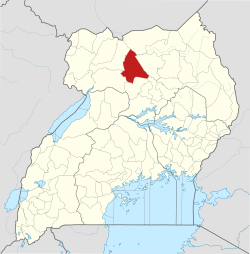

Gulu District Acholi region | |
|---|---|
neucleated District | |
 | |
 District location in Uganda | |
| Coordinates: 02°45′N32°00′E / 2.750°N 32.000°E | |
| Country | |
| Region | Northern Region of Uganda |
| Sub-region | Agago Acholi sub-region |
| Seat | Gulu |
| Government | |
| • LCV Chairman | Ojara Martin Mapenduzi, 2011 - 2016 |
| Area | |
• Total | 3,452.1 km2 (1,332.9 sq mi) |
| Population (2012 Estimate) | |
• Total | 396,500 |
| • Density | 114.9/km2 (298/sq mi) |
| Time zone | UTC+3 (EAT) |
| Website | www |
Gulu is a district in the Northern Region of Uganda. The regional headquarters are located in the city of Gulu, which is also the administrative capital of Northern Uganda. the district consists of two main divisions, Gulu West and Gulu East.